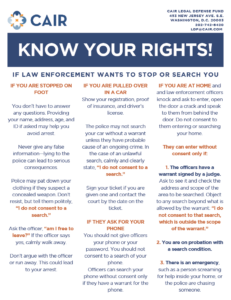Since its establishment in 1994, CAIR has been safeguarding the civil liberties guaranteed by the Constitution and the Bill of Rights. The resources below were crafted by CAIR staff as handy guidelines to knowing your rights in various situations.
As An Employee
Federal law makes it illegal for an employer to discriminate against an employee on the basis of religion, race, or national origin.
Title VII of the 1964 Civil Rights Act guarantees your right to:
- Reasonable religious accommodation: The failure of an employer to reasonably accommodate your religious practices may constitute employment discrimination. ‘Religious practices’ include wearing a beard, prayer breaks, hijab and going to Jummah (Friday) prayers.
- Fairness in hiring, firing, and promotions: Your employer is prohibited from considering religion when making decisions affecting your employment status.
- A non-hostile work environment: Your employer must ensure that you are not subjected to anti-Muslim insults, harassment or unwelcome and excessive proselytizing.
- Complain about discrimination without fear of retaliation: Federal law guarantees your right to report an act of alleged employment discrimination. It is illegal for your employer to retaliate against you for your complaint.
When Faced with Discrimination on the Job
- Remain calm and polite.
- Inform the offending party that you believe his/her actions are discriminatory.
- Report the discriminatory action in writing to company management.
- Begin documenting the discrimination by saving memos, keeping a detailed journal, noting the presence of witnesses and making written complaints. Make sure to keep copies of all materials. It is important to keep a “paper trail” of evidence.
- Call the Equal Employment Opportunity Commission (EEOC) at 800-669-4000 or local county or state civil rights agencies to educate yourself about legal options.
- Contact a local attorney who is licensed to practice in your state to discuss your case.
- DO NOT sign any documents or resign without an attorney’s advice.
- Ask to be transferred to another department or job site.
- Ask for mediation.
- Contact CAIR to file a report.
- Consider looking for a new job.
As A Student
- You have the right to inform others about your religion: You have the right to pass out literature or speak to others about Islam, as long as it is not done in a disruptive manner.
- You have the right to wear religious clothing: You also have the right to wear clothing with a religious message, as long as other clothes with similar messages are allowed.
- You have the right to organize student-led prayer on campus, as long as the service is not disruptive to the function of the school.
- You may have the right to attend Friday prayer: The Supreme Court has upheld the right of states to allow students “release time” to attend religious classes or services.
- You have the right to be excused from school for religious holidays: You should be sure to inform the school that you will be absent in advance.
- You have the right to be excused from class discussions or activities that you find religiously objectionable: If you have any questions, please contact CAIR.
- You have the right to form an extracurricular Muslim student group.
As A Traveler
Click here for a PDF summary of the follow traveler guidelines!
The Transportation Security Administration (TSA) conducts safety-related searches for weapons and explosives.
Your Rights In the Airport:
Primary Screening – Metal detector including an x-ray of your luggage and shoes, AND body scanner or pat down (it’s your choice)
If you are stopped by law enforcement when in an airport, either arriving or departing, law enforcement agents CAN also detain you briefly if they feel that you are a security risk or that you are doing some specific illegal activity.
TSA screeners CANNOT
- Target you for additional screening or questions based on racial or ethnic profiling.
- Ask you general questions without some probable cause, i.e. They cannot question you about your personal life where you spend time, work, worship, etc.
- Handcuff you or strip search you.
Customs and Border Protection When Traveling into the US by Car or Plane: Customs and Border Protection (CBP) secures our country by preventing the illegal entry of people and goods while facilitating legitimate travel and trade.
CBP CAN question you regarding:
- Your citizenship
- The nature or purpose of your trip
- Anything you are bringing back to the United States that you did not have with you when you left
- They can examine your baggage and everything in it
- They can confiscate your electronic items
CBP CANNOT
- Target you for additional screening or questions based on racial or ethnic profiling
- Ask you general questions without some probable cause, i.e.. They can not ask you about your personal life—where you spend time, work, worship, your friends, etc.
- Handcuff you or strip search you*
- Confiscate your electronic property without an inventory
*CBP cannot strip search as a matter of routine, but they may perform a strip search of you if there is “some level of individualized suspicion.” Of course such a search must be conducted by a person of the same gender as yourself.
As an airline passenger, you are entitled to courteous, respectful and non-stigmatizing treatment by airline and security personnel.
It is illegal for law enforcement officials to perform any stops, searches, detentions, or removals based solely on your race, religion, national origin, gender, or ethnicity.
If you believe you have been treated in a discriminatory manner, you should do the following:
- Ask for the names and ID numbers of all persons involved in the incident. Be sure to write this information down
- Ask to speak to a supervisor.
- Politely ask if you have been singled out because of your name, looks, dress, race, ethnicity, religion or national origin.
- Politely ask witnesses to give you their names and contact information.
- Write down a statement of facts immediately after the incident. Be sure to include the flight number, the flight date and the name of the airline.
- Contact CAIR to file a report. If you are leaving the country, leave a detailed message, with the information above at 513-281-8200 or go to www.ca.cair.com to file a report.
- Even if you do not want to file a complaint, it is important to contact CAIR with information about what happened to you so we can compile national statistics.
It is important to remember the following:
- A customs agent has the right to stop, detain, and search every person and item coming into the US.
- Agents have the authority to conduct a further search of you or your bags.
- A pilot has the right to refuse to fly a passenger if he or she believes the passenger is a threat to the safety of the flight. The pilot’s decision must be reasonable and based on observation of you, not stereotypes.
If Law Enforcement Approaches or Contacts You

 All Americans have the constitutional right of due process and to be politically active.
All Americans have the constitutional right of due process and to be politically active.
If you are visited by federal law enforcement agencies, remember:
- You should have a lawyer present when speaking with federal law enforcement agencies: Under the law, you have the legal right to have a lawyer present when speaking with federal law enforcement agencies. This is true even if you are not a citizen. This is your legal right. Refusing to answer questions cannot be held against you and does not imply that you have something to hide.
- You do not have to permit them to enter your home or office if they do not have a warrant: Under U.S. law, law enforcement agents must possess a search warrant in order to enter your house. If they say they have a warrant, kindly demand to see it before allowing them to enter. The warrant will specify exactly what can be searched and if they have a warrant, be courteous and polite and remember that you are under no obligation to answer questions without a lawyer present.
- You should never lie or provide false information to any law enforcement agencies: Lying to law enforcement agents is a federal crime and should never be done under any circumstance.
During Ramadan

This Ramadan, we want to provide our community with all the information they will need regarding their rights at work and school. To immerse yourself fully into this blessed month, our Civil Rights team has provided downloadable accommodation letters for you to use.
Whether you need to request time off for Eid, take a short break so you can break your fast, change shifts so you don’t miss Taraweeh, or skip P.E. for the month, we’ve got you covered.
Please share these letters with your family and friends so they can benefit too.
YOUR RIGHTS AT WORK
While it might seem intimidating to request accommodation at work, remember that you have a right to practice your religion and there are laws that ensure you can exercise this right.
California law requires that an employer reasonably accommodate an employee’s religious beliefs or practices unless doing so would create an undue burden in conducting business. Some common accommodations that you are entitled to during Ramadan include:
- Flexible scheduling to allow for Jummah, Iftar, and Taraweeh
- Shift substitutions or swaps
- Job reassignments
- Modification of workplace policies (schedule, attire, etc.)
As you submit your requests for accommodation, please keep in mind that you will need to:
- Submit the request to the appropriate parties as soon as possible.
- Make your request in writing.
- Ensure you are familiar with your companies’ procedures regarding religious accommodations.
You can request this in writing by filling out the accommodation request template here.
YOUR RIGHTS AT SCHOOL
Students have a right to be accommodated during Ramadan and can be excused from strenuous activities or be excused from lunch to go to the library or take a nap during the lunch break.
Parents are encouraged to contact their children’s schools and teachers in advance and in writing to request religious accommodations for their children during Ramadan and Eid. Schools cannot penalize students for missing a day for religious holidays.
You can request this in writing by filling out the accommodation request template here.
WHAT IF MY REQUEST GETS DENIED?
Federal and state law generally protect a Muslim’s right to practice religion at work and at school. However, this right is not absolute and depends on several factors. Although your school/employer is generally required to provide reasonable accommodations, you may not receive the exact accommodation you are requesting. They may even deny the request completely. If either of these things happen, contact our legal team. They can provide you with additional support so that you can take full advantage of this holy month, insha’Allah.
WHAT IS REASONABLE ACCOMMODATION?
Reasonable accommodation eliminates the employee’s conflict between his or her religious practices and work requirements and does not cause undue hardship for the employer. This means that the employer cannot unequivocally refuse to make a religious accommodation, but rather the employer must engage in a good-faith interactive process to resolve the conflict between your religious needs and the job’s requirements.
These template letters are not intended to give legal advice, but rather general legal information and serve as a general resource. No attorney-client relationship is created by using the templates. You should consult an attorney for legal advice specific to your situation.
When Traveling to Hajj

Preparing for Exit and Entry in the United States
- Plan Ahead – Always tell someone about your travel plans and provide them with your travel itinerary. Text your contacts from the airplane to let them know you’ve landed. They should contact CAIR-SV/CC if you’re delayed longer than four hours. Since CBP often denies phone access for those in secondary inspection, make sure to call your contacts before inspection.
- Protect Your Electronic Privacy – Consider disabling the fingerprint reader on your phone since CBP officers can compel you to unlock your phone with your fingerprint. You do not have to provide passwords or unlock devices, but refusing to consent to a search of electronic devices may lead to their confiscation. If an officer searches and/or confiscates your laptop or cellphone, write down the officer’s name and get a receipt for your property.
- Tell the Truth – Statements to CBP officers (either orally or in writing) must be truthful. Any lie – even a small one – is a crime.
- Don’t Sign – DO NOT sign ANYTHING before speaking to a lawyer.
- Ask Questions – Politely ask why you have been selected for an additional search.
- Document Inappropriate Questions and/or Discrimination – Inappropriate questions include questions about your religious practices, political activities, race, your relatives and/or friends, etc. Write down the agents’ names, badge numbers and the questions asked.
- Report – Contact CAIR-SV/CC via our online intake form or by calling 916-441-6269 to report what happened.
Tips for U.S. Citizens
- U.S. citizens have an absolute right to enter the U.S. after traveling abroad.
- If selected for secondary inspection, you have the right to decline to answer intrusive questions about your religious or political beliefs. Refusing to answer questions may cause lengthy delays.
- If you are questioned about possible crimes, you should expressly request an attorney. You are entitled to an attorney for any criminal questioning and may exercise your right to remain silent.
Tips for Green Card Holders
- Green card holders cannot be stripped of their immigration status without a hearing before an immigration judge.
- Prolonged absences do not lead to automatic abandonment of a green card unless a green card holder signs Form l-407. Green card holders should not sign any documents presented by a CBP officer without fully understanding the contents of the document they are signing.
- Green card holders should consult with an attorney before traveling.
Tips for Non-immigrant Visa Holders
- You have the right to refuse to answer intrusive questions and to refuse to provide passwords to electronic devices and applications, but exercising these rights can come at a price.
- CBP has broad discretion to refuse non-citizens entry to the United States and refusing to comply with even discriminatory searches may prevent you from being admitted. If you answer, your statements may be used against you in a criminal, terrorism or immigration investigation.
- Non-immigrant visa holders should consult with an attorney before traveling.
